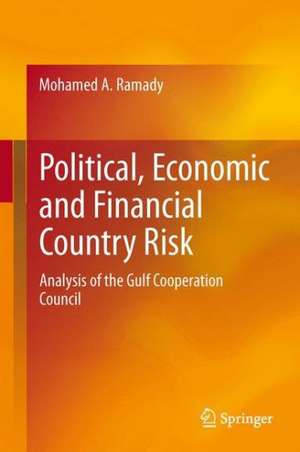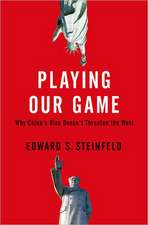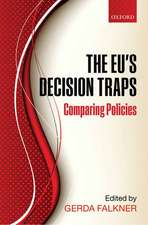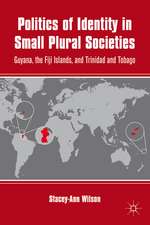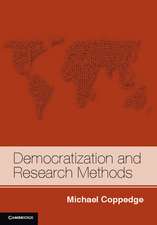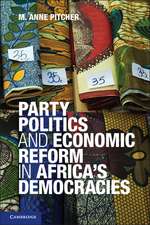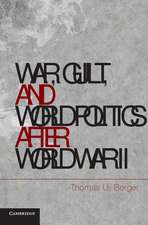Political, Economic and Financial Country Risk: Analysis of the Gulf Cooperation Council
Autor Mohamed A. Ramadyen Limba Engleză Hardback – 30 oct 2013
By comparison, with some exceptions, the six countries comprising the Gulf Cooperation Council have been relatively unaffected by the general turbulence and uncertainties lapping around them. However, geopolitical shifts involving global superpower rivalries, combined with revolutionary breakthroughs in the non-conventional hydrocarbon energy sector are threatening to challenge the importance of the Arabian Gulf as the world’s leading suppliers of energy, putting their economies under fiscal stress. The author examines such challenges by:
• Providing the first in-depth statistical analytical assessment of the GCC countries using monthly data over the period 2001 -2013 for the three risk categories- economic, financial and political risks- and their sub –components so as to enable policymakers enhance components with low risk , while addressing components with perceived higher risk,
• Assessing FDI and capital inflows and outflows before and after the “Arab Spring” , and how to encourage FDI inflows,
• Inter –Arab and GCC trade and synergies in power transmission , transportation links and establishing new hubs of centers of manufacturing excellence ,
• Exploring private sector-led growth models to reduce forecasted unemployment.
Being complacent is not an option for the GCC. The aim of the book is that having a better understanding of each of the GCC countries’ individual riskparameters will enable the GCC meet future challenges and reduce the chances of a negative ‘Arab Spring’ occurring in the region.
Mohamed Ramady is a Visiting Associate Professor at the Department of Finance and Economics, King Fahd University of Petroleum and Minerals. His main research interests are the economics of the Middle East and Saudi Arabia in particular, as well as money and banking He also held senior positions with international financial institutions in the Arabian Gulf and Europe.
| Toate formatele și edițiile | Preț | Express |
|---|---|---|
| Paperback (1) | 370.49 lei 38-44 zile | |
| Springer International Publishing – 23 aug 2016 | 370.49 lei 38-44 zile | |
| Hardback (1) | 397.76 lei 6-8 săpt. | |
| Springer International Publishing – 30 oct 2013 | 397.76 lei 6-8 săpt. |
Preț: 397.76 lei
Nou
Puncte Express: 597
Preț estimativ în valută:
76.11€ • 82.93$ • 64.13£
76.11€ • 82.93$ • 64.13£
Carte tipărită la comandă
Livrare economică 23 aprilie-07 mai
Preluare comenzi: 021 569.72.76
Specificații
ISBN-13: 9783319021768
ISBN-10: 3319021761
Pagini: 275
Ilustrații: XXII, 281 p. 95 illus.
Dimensiuni: 155 x 235 x 25 mm
Greutate: 0.64 kg
Ediția:2014
Editura: Springer International Publishing
Colecția Springer
Locul publicării:Cham, Switzerland
ISBN-10: 3319021761
Pagini: 275
Ilustrații: XXII, 281 p. 95 illus.
Dimensiuni: 155 x 235 x 25 mm
Greutate: 0.64 kg
Ediția:2014
Editura: Springer International Publishing
Colecția Springer
Locul publicării:Cham, Switzerland
Public țintă
ResearchCuprins
Part I.- Foundation and Key concepts.- GCC Country Risk andthe " Arab Spring ".- Country Risk assessments.- Part II : Indicators of Country Risk analysis.- Indicatorsof Financial Risk.- Determinants of Country economic risk.- Country politicalrisk contents.- Part III : GCCCountry economic , financial andpolitical risk analysis.- Kingdom of Saudi Arabia risk analysis.- State of Kuwait risk analysis.- State of Qatar risk analysis.- Kingdom ofBahrain risk analysis.- Sultanate ofOman risk analysis.- United ArabEmirates risk analysis.- GCC CompositeRisk : Political risk at the core.- Part IV: Current Challenges.- GCC Inwardand Outward Foreign Direct Investment and Capital Flows.- GCC countries and the"Arab Spring: : shielded but notimmune.- Conclusions and Recommendations.- Bibliography.- Index.
Recenzii
From the reviews:
“Political, Economic, and Financial Country Risk. Analysis of the Gulf Cooperation Council is an extremely resourceful book, offering a wide range of information not only on the GCC states but also on widespread rating practices. To a certain degree, the book can be used as a handbook … . practitioners could also benefit from more links between the single facts that would at times make it easier to get a bigger picture of the issues at stake.” (Annika Kropf, Review of Middle East Economics and Finance, Vol. 10 (1), 2014)
“Political, Economic, and Financial Country Risk. Analysis of the Gulf Cooperation Council is an extremely resourceful book, offering a wide range of information not only on the GCC states but also on widespread rating practices. To a certain degree, the book can be used as a handbook … . practitioners could also benefit from more links between the single facts that would at times make it easier to get a bigger picture of the issues at stake.” (Annika Kropf, Review of Middle East Economics and Finance, Vol. 10 (1), 2014)
Textul de pe ultima copertă
“Decades go by and nothing happens; then weeks go by and decades happen”. This apt saying encapsulates the dramatic convulsions taking place across the Arab world that first erupted in 2011 in Tunisia and which rapidly spread to other countries. These events have affected the lives of ordinary citizens in many more ways than had been intended when the ‘Arab Spring’ broke out, with the endgame still not very clear as demonstrated in countries like Egypt, Syria and Libya.
By comparison, with some exceptions, the six countries comprising the Gulf Cooperation Council have been relatively unaffected by the general turbulence and uncertainties lapping around them. However, geopolitical shifts involving global superpower rivalries, combined with revolutionary breakthroughs in the non-conventional hydrocarbon energy sector are threatening to challenge the importance of the Arabian Gulf as the world’s leading suppliers of energy, putting their economies under fiscal stress. The author examines such challenges by:
• Providing the first in-depth statistical analytical assessment of the GCC countries using monthly data over the period 2001 -2013 for the three risk categories- economic, financial and political risks- and their sub –components so as to enable policymakers enhance components with low risk , while addressing components with perceived higher risk,
• Assessing FDI and capital inflows and outflows before and after the “Arab Spring” , and how to encourage FDI inflows,
• Inter –Arab and GCC trade and synergies in power transmission , transportation links and establishing new hubs of centers of manufacturing excellence ,
• Exploring private sector-led growth models to reduce forecasted unemployment.
Being complacent is not an option for the GCC. The aim of the book is that having a better understanding of each of the GCC countries’ individual riskparameters will enable the GCC meet future challenges and reduce the chances of a negative ‘Arab Spring’ occurring in the region.
Mohamed Ramady is a Visiting Associate Professor at the Department of Finance and Economics, King Fahd University of Petroleum and Minerals. His main research interests are the economics of the Middle East and Saudi Arabia in particular, as well as money and banking He also held senior positions with international financial institutions in the Arabian Gulf and Europe.
By comparison, with some exceptions, the six countries comprising the Gulf Cooperation Council have been relatively unaffected by the general turbulence and uncertainties lapping around them. However, geopolitical shifts involving global superpower rivalries, combined with revolutionary breakthroughs in the non-conventional hydrocarbon energy sector are threatening to challenge the importance of the Arabian Gulf as the world’s leading suppliers of energy, putting their economies under fiscal stress. The author examines such challenges by:
• Providing the first in-depth statistical analytical assessment of the GCC countries using monthly data over the period 2001 -2013 for the three risk categories- economic, financial and political risks- and their sub –components so as to enable policymakers enhance components with low risk , while addressing components with perceived higher risk,
• Assessing FDI and capital inflows and outflows before and after the “Arab Spring” , and how to encourage FDI inflows,
• Inter –Arab and GCC trade and synergies in power transmission , transportation links and establishing new hubs of centers of manufacturing excellence ,
• Exploring private sector-led growth models to reduce forecasted unemployment.
Being complacent is not an option for the GCC. The aim of the book is that having a better understanding of each of the GCC countries’ individual riskparameters will enable the GCC meet future challenges and reduce the chances of a negative ‘Arab Spring’ occurring in the region.
Mohamed Ramady is a Visiting Associate Professor at the Department of Finance and Economics, King Fahd University of Petroleum and Minerals. His main research interests are the economics of the Middle East and Saudi Arabia in particular, as well as money and banking He also held senior positions with international financial institutions in the Arabian Gulf and Europe.
Caracteristici
Examines empirically each GCC country’s political, financial, and economic risk to explore the macro drivers of each type of GCC country risk Investigates the relationship between capital flow inflows and outflows and the drivers of country risk Explores the GCC since the onset of the Arab Spring in 2011 and how each region will meet future challenges?
